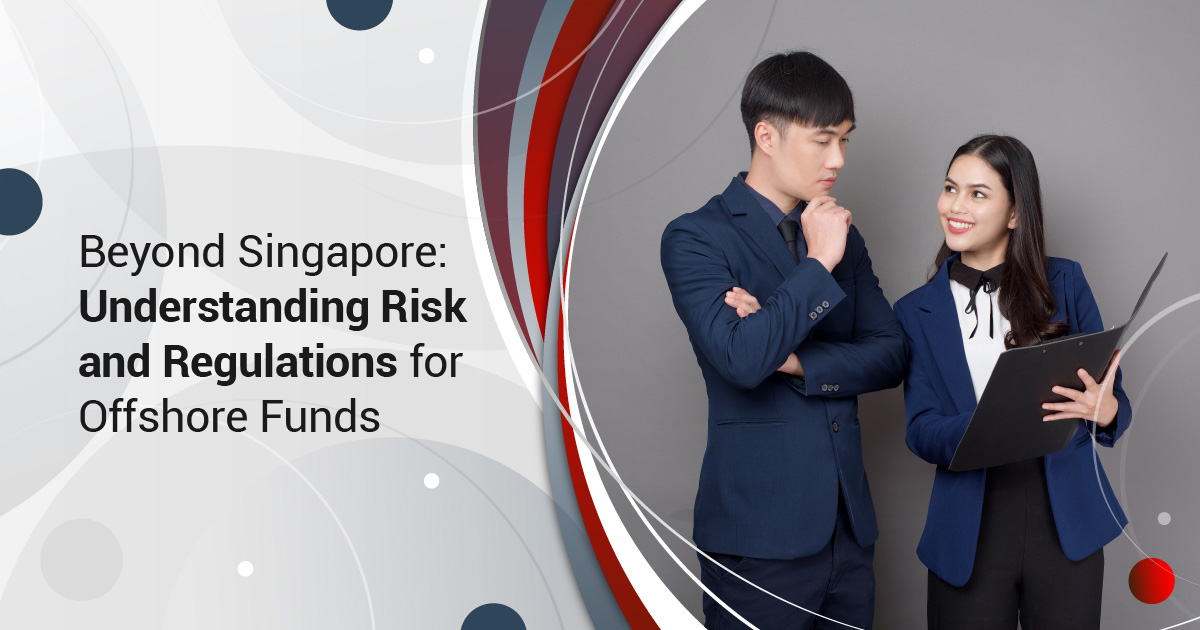Singapore fund managers face a deceptively simple question: should we establish our next fund offshore? The answer appears straightforward – access diverse investor pools, benefit from tax neutrality, and tap into specialised legal vehicles. Yet this decision triggers a complex operational reality that many underestimate.
The choice to manage offshore funds creates a “dual compliance burden.” Your Singapore entity remains fully accountable to the Monetary Authority of Singapore (MAS) standards while simultaneously adhering to the specific regulatory requirements of your chosen offshore domicile.
Consider the practical implications: a Cayman Islands fund requires 10% beneficial ownership disclosure, whilst Singapore’s threshold sits at 25%. In just this one scenario, your sanctions screening must expand beyond Singapore, UN, and US OFAC lists to include EU, UK, and Cayman-specific requirements.
Recent MAS enforcement actions also demonstrate a heightened focus on senior manager accountability, while the transition from RFMC to A/I LFMC licensing as of August 2024 required substantial operational upgrades. In essence, what once may have been a straightforward decision now requires careful consideration.
This article provides fund managers with a practical framework for making informed offshore decisions, examining strategic trade-offs between jurisdictions and offering proven risk mitigation strategies based on our cross-border fund experience.
Key Takeaways
- Managing offshore funds requires adherence to both MAS standards in Singapore and the regulatory requirements of the chosen offshore jurisdiction, doubling compliance responsibilities.
- The choice of jurisdiction should align with target investors’ preferences. Cayman Islands attract US and Asian investors, while Luxembourg and Ireland cater to European institutions. Singapore’s VCC structure is gaining traction among Asian investors.
- Global frameworks like FATCA, CRS, and AML/CFT regulations apply across all major domiciles, requiring robust due diligence, sanctions screening, and tax reporting.
- Proactive risk management, including third-party testing, cybersecurity controls, and service provider due diligence, is essential to navigate the complexities of offshore operations.
- Offshore structures unlock diverse capital pools and provide tax advantages, making them a strategic choice for fund managers prepared to meet the compliance challenges.
Your Singapore Base: How MAS Requirements Shape Offshore Operations

Establishing an offshore fund does not reduce your MAS compliance burden; it can actually double it. You remain fully subject to Singapore’s rigorous standards whilst taking on the additional requirements of your chosen offshore jurisdiction.
The Licensed Fund Management Company (LFMC) framework forms your operational foundation. Most managers targeting sophisticated offshore investors need Accredited/Institutional LFMC status, which demands at least S$250,000 base capital plus specific personnel requirements:
- Minimum two directors, at least one Singapore resident
- Chief Executive Officer with ten years relevant experience, Singapore resident
- At least two full-time Singapore-based representatives for each regulated activity
MAS oversight extends indirectly into your offshore activities. The 2021 Cross-Border Arrangements Regulations allow foreign offices to operate without separate Singapore licensing, but your Singapore entity bears ultimate responsibility for AML/CFT compliance across all arrangements.
Recent changes hit particularly hard. The enhanced Fair Dealing Guidelines now cover all investor types, including the accredited and institutional clients typically found in offshore funds. This means side letters, client rejections, and fee disclosures all require careful justification under MAS principles, regardless of your fund’s domicile.
Strategic Jurisdiction Selection: Beyond Tax Neutrality
When choosing a domicile, we recommend looking beyond simple tax benefits. Modern jurisdiction selection now revolves around one critical question: where are your target investors, and what structures do they demand?
The Traditional Offshore Leaders
The Cayman Islands commands 75% of offshore hedge funds for good reason. US pension funds, Asian family offices, and Middle Eastern sovereign wealth funds understand Cayman structures instinctively. They have invested through these vehicles for decades, creating institutional muscle memory that translates into faster due diligence and smoother capital deployment.
The BVI takes a different approach, prioritising speed and cost efficiency. Emerging managers value BVI’s streamlined approval processes, where you can launch an Incubator Fund within two business days. This makes it ideal for testing strategies with friends and family capital or establishing proof of concept before pursuing institutional investors.
Related Read: What Are the Offshore Company Benefits for Investors and Companies?
The European Gateway
Luxembourg and Ireland serve an entirely different investor universe. European institutional investors (pension funds, insurance companies, sovereign wealth funds) often mandate EU-domiciled funds with UCITS or AIFMD passports. These passport rights allow seamless marketing across all EU member states, but they demand genuine operational substance and regulatory oversight.
Singapore’s Growing Appeal
We have observed a trend that many overlook: Asian institutional investors are shifting preferences. Japanese pension funds, Korean insurers, and Indonesian sovereign funds increasingly favour regulated domiciles over traditional offshore centres. Singapore’s Variable Capital Company structure capitalises on this trend, offering 90+ double taxation agreements and transparent regulation that sophisticated Asian capital appreciates.
Universal Compliance Standards

In this modern environment, one cannot escape compliance by simply choosing to go offshore. International bodies like the Financial Action Task Force (FATF) and the Organisation for Economic Co-operation and Development (OECD) have created universal standards that follow your fund regardless of domicile. These are mandatory frameworks that create operational headaches, even for managers who underestimate their complexity.
AML/CFT: Where Rules Collide
Here is where the dual compliance burden becomes painfully real. You might think AML rules are standardised globally, but the devil lives in the details. As we mentioned earlier, for example, Singapore requires 25% beneficial ownership disclosure, while the Cayman Islands demands 10%. For the same corporate investor, you will need deeper due diligence to satisfy Cayman requirements than Singapore rules alone would demand.
Sanctions screening creates another compliance maze. Your Singapore operations screen against Singapore, UN, and US OFAC lists. Add a Cayman fund, and you must expand screening to include EU, UK, and Cayman-specific requirements. This is not just about buying more expensive software – it means more alerts, more false positives, and more time spent investigating potential matches.
Luxembourg illustrates how serious regulators have become. The Commission de Surveillance du Secteur Financier (CSSF) and Administration de l’enregistrement recently expanded AML reporting obligations to encompass all Alternative Investment Funds, including previously unregulated structures. The message is clear: there is nowhere to hide.
Automatic Exchange of Information: The Global Tax Transparency Net
The US Foreign Account Tax Compliance Act (FATCA) and OECD’s Common Reporting Standard (CRS) have been implemented across all major domiciles (including the Cayman Islands, BVI, Luxembourg, and Ireland), turning your fund into an automatic tax reporting entity. These global information-sharing regimes require funds to identify tax-resident investors and report their account details to local authorities, who then share this data with relevant foreign tax administrations.
You will register with local tax authorities, collect investor self-certifications, and file annual reports on all “reportable accounts.” Your fund administrator handles the mechanics, but you bear ultimate responsibility for accuracy and completeness.
Risk Mitigation Framework and Best Practices
We see the most effective managers build defences before problems emerge. The complexity of offshore operations demands proactive risk management that addresses both operational vulnerabilities and strategic threats.
Operational Resilience Across Borders
Your Business Continuity Plan requires third-party testing. Avoid testing your own systems – validate that your domicile’s fund administrator can maintain operations during disruptions. Map all dependencies, establish recovery time objectives, and conduct regular stress tests that include your entire offshore ecosystem.
Technology risks also multiply across borders. Ensure your cybersecurity controls meet MAS standards whilst protecting data that flows between Singapore and offshore service providers. Your incident response plan must account for different time zones, legal frameworks, and notification requirements.
Strategic Risk Prevention
Service provider due diligence becomes your lifeline. Before appointing any offshore administrator, scrutinise their compliance capabilities, screening systems, and regulatory knowledge across multiple jurisdictions. A weakness in your administrator creates a catastrophic single point of failure.
Monitor jurisdictional reputation continuously. FATF black-listing or even grey-listing can devastate investor confidence and create banking difficulties. Stay informed about international reviews of your chosen domiciles and maintain contingency plans for potential reputation damage.
The offshore advantage exists, but only for managers who respect its complexity and prepare accordingly.
Where to Next With InCorp

Offshore fund management will test every aspect of your operational capabilities. We encourage fund managers not to think of it as escaping regulations, but rather embracing a more demanding compliance environment that rewards preparation and punishes shortcuts.
Your jurisdiction choice becomes your investor access strategy. Pick Cayman, and you will speak the language US pension funds understand. Select BVI for speed, but accept that sophisticated investors might question your substance.
The dual compliance burden will, however, be your daily reality. Every investor onboarding requires dual due diligence standards. Every sanctions alert needs multiple jurisdiction checks. Every regulatory update demands assessment across your entire offshore ecosystem.
Yet, the rewards justify the effort. Offshore structures unlock capital pools that domestic vehicles simply cannot access. They provide tax efficiency that enhances investor returns whilst demonstrating your commitment to serving global institutional capital on their preferred terms.
At InCorp, we have guided managers through successful offshore establishments across major jurisdictions. We understand both MAS requirements and offshore regulatory demands, helping you avoid costly mistakes while building structures that attract institutional capital. Contact us today to discuss your offshore strategy.
FAQs about Risk and Regulations for Offshore Funds
What compliance obligations do Singapore fund managers have for offshore funds?
- Singapore fund managers remain subject to full MAS oversight even when managing offshore funds. This includes enhanced Fair Dealing Guidelines, AML/CFT requirements, and senior manager accountability standards. The offshore structure creates additional compliance obligations rather than reducing them.
Which offshore jurisdiction is best for Singapore-based fund managers?
- The optimal jurisdiction depends on your target investor base. Cayman Islands generally suits US and Asian investors, BVI offers cost-effective flexibility for emerging managers, while Luxembourg and Ireland provide EU market access. Singapore's VCC structure increasingly appeals to Asian institutional investors seeking regulated domiciles.
How do AML requirements differ between Singapore and offshore jurisdictions?
- Requirements vary significantly across jurisdictions. Singapore requires 25% beneficial ownership disclosure, while Cayman Islands demands 10%. Sanctions screening must expand to include jurisdiction-specific lists beyond Singapore's standard UN, US OFAC requirements.


